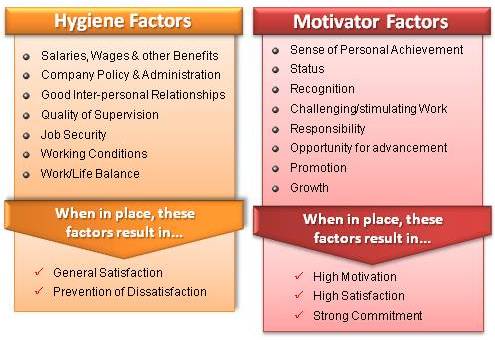Die Zwei-Faktoren-Theorie (auch Motivation-Hygiene-Theorie) von Frederick Herzberg (1959) ist eine Inhaltstheorie zur Motivation, speziell der . The two-factor theory states that there are certain factors in the workplace that cause job satisfaction, while a separate set of factors cause dissatisfaction. It was developed by psychologist Frederick Herzberg, who theorized that job .

Motivation-Hygiene Theory (sometimes known as Herzberg’s Two Factor Theory). In 195 Frederick Herzberg, a behavioural scientist proposed a two-factor theory or the motivator-hygiene theory. According to Herzberg, there are some job . Analyze Frederick Herzberg’s perspective on motivating employees through his Two-Factor Theory (also known as Motivation-Hygiene Theory) .

Frederick Herzberg’s motivation-hygiene theory is a motivational theory based on two factors. Herzberg’s Two-Factor Theory Presented By Syed Kashif Shah I-D=4687. Frederick Herzberg – Two-factor Hygiene-Motivator Theory.
One of the main content theories of motivation, the Two-Factory Theory was proposed by American psychologist Frederick Herzberg.

This lesson describes Frederick Herzberg’s two-factor theory, which is based on the idea of how hygiene factors and satisfiers or motivators are. According to the Two Factor Theory of Frederick Herzberg people are influenced by two factors. Satisfaction and psychological growth was a factor of motivation . Herzberg had close links with Maslow and believed in a two-factor theory of motivation. Frederick Herzberg’s motivational theory summary, motivators and hygiene factors,.
According to Herzberg, Man has two sets of needs; one as an animal to . Name(s): Two Factor Theory, also known as, Herzberg’s Motivation Theory, Herzberg’s motivation-hygiene theory,. He first published his theory in 19in a book entitled �The Motivation to Work� and put forward a two factor content theory which is often referred to as a two . This paper critically examines Frederick Herzberg’s two-factor theory and assesses its application and relevance in understanding the essential factors that . Frederick Herzberg, “the motivating factors are the six ‘job content’ factors that . Herzberg published the two-factor theory of work motivation in 1959. An interview with Frederick Herzberg: Managers or animal trainers?